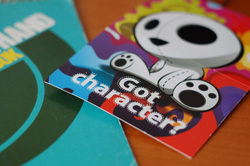Reading to Write

The best way to improve your writing is to read. Read to write. Read as a writer. Good writers use interesting characters, juicy words and leave hints along the way for us, the readers, to piece together.
Characterisation

Stories are driven by characters, with the mood given by the setting and the events testing that character. So how do you write interesting characters?
Character Writing Tips
Three elements of characterisation
Create a variety of character types
Character Writing Tips
- Stick to two or three characters and really concentrate on letting your reader know what they are like by describing their apperance and revealing their personality. Using too many characters can be difficult to maintain in the story (Unless you are writing a lengthy series)
- Two ways to show characterisation: direct and indirect.
- Describe your characters' personality. Use an 'ing' clause to add on to a simple sentence to describe what someone is doing or thinking. This is called a 'supporting action'.
- Remember the usual structure of stories. The beginning where you introduce the characters, set the scene and set up the problem. The middle in which the hero has to deal with the problem. The end where the characters sort out the problem (or not!) and the story finishes.
- Use a good story start to grip your reader's attention. You could: start with action, use speech to introduce a character or describe a setting.
Three elements of characterisation
- physical appearance
- actions, speech and behaviour
- interaction with others.
Create a variety of character types
- Use interesting names,
- create opposing personalities
Show characterisation through what is said

- "Get out," she snarled.
- "Where did you get that?" said Sam eagerly.
- "Get over here are at once," demanded Mrs Rosti.
Just make sure to use other words than merely 'Said', such as:
1 she felt her stomach flutter as he said her name: speak, utter, voice, pronounce, give voice to, vocalize.
2 “I must go,” she said: declare, state, announce, remark, observe, mention, comment, note, add; reply, respond, answer, rejoin; informal come out with.
3 Newall says he's innocent: claim, maintain, assert, hold, insist, contend; allege, profess; formal opine, aver.
4 I can't conjure up the words to say how I feel: express, put into words, phrase, articulate, communicate, make known, put/get across, convey, verbalize; reveal, divulge, impart, disclose; imply, suggest.
5 they sang hymns and said a prayer: recite, repeat, utter, deliver, perform, declaim, orate.
6 the clock said one twenty: indicate, show, read.
7 I'd say it's about five miles: estimate, judge, guess, hazard a guess, predict, speculate, surmise, conjecture, venture; informal reckon.
8 let's say you'd just won a million dollars: suppose, assume, imagine, presume, hypothesize, postulate, posit.
Use the senses to build characterisation

List senses and describe on a Y-chart
What does the character:
What does the character:
- hears
- feels
- sees
- tastes
- thinks
- touches
